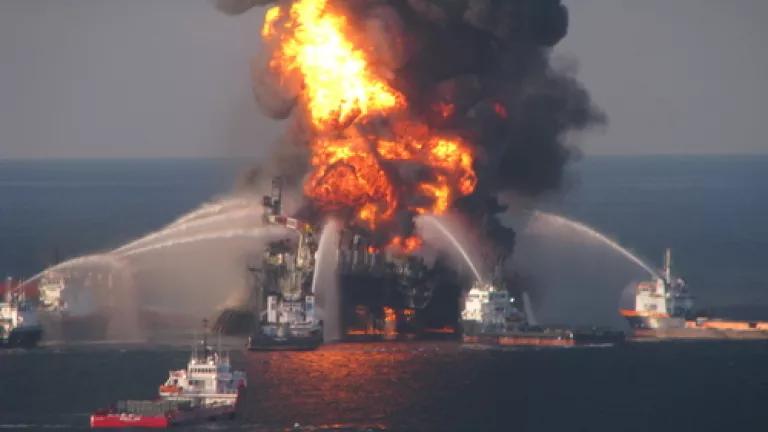
Oil giant BP recently settled with a large group of plaintiffs in the Deepwater Horizon disaster, agreeing to pay an estimated $7.8 billion in health and other expenses for people and businesses hurt by the April 2010 spill. While the settlement provides some relief for Gulf residents, it is by no means the end of the case against BP.
Deepwater Horizon in flames, April 21, 2010 (Credit: US Coast Guard)
The company still faces federal and state government lawsuits, and potential penalties of more than $17 billion for environmental violations. BP is keen to settle with government as well, in the hopes of avoiding the cost and bad publicity of a lengthy trial. The company would also like to make nice with the feds--it needs permission for its plan to expand drilling operations in the Gulf.
How the remainder of the case pans out says a lot about the future of energy in this country. Will the government allow BP, and the rest of the oil industry, to continue business as usual with nothing more than a slap on the wrist? Or will the company be put on trial and held accountable for its actions? Will the penalties be severe enough to make the oil industry clean up its act? BP reported profits of $21.7 billion in 2011, nearly 3 times the estimated cost of its settlement with private parties in the Gulf.
It's hard to predict what the outcome will be. While many in the Gulf would relish seeing BP on trial, the government might not be as eager to administer a public slap-down of Big Oil--especially now, when gas prices are high, and politicians of all stripes are issuing the usual calls for expanded drilling (which, although politically expedient, does little to bring down the price of oil.)
Whether the case settles or not (my colleague David Pettit has outlined what a full settlement should look like), it's clear that drilling cannot continue exactly as before. There have been at least 79 serious accidents in the Gulf in the past 15 years, according to the Presidential Oil Spill Commission. We need a comprehensive overhaul of drilling safety regulations, informed by what happened on Deepwater Horizon. Both BP and the government have collected reams of data about the spill and its impacts, which they haven't released to the public because of the lawsuit. This information needs to be released so we can improve drilling safety and get to work restoring the health of the Gulf and its people.
We also need to think long and hard about how much we, as a nation, are willing to sacrifice to continue the hunt for oil. The number of oil rigs in the United States has increased 150 percent since 2000. We are producing more oil now than we have in nearly a decade. Still, we struggle with high gas prices. Still, we hear calls to expand drilling in the Gulf and now in the Arctic.
Even if we did suddenly get access to lots of cheap oil, we still can't use it without harming the climate. We're already seeing an uptick in dangerous floods, droughts, fires and storms that are the predicted results of global warming. So what do we gain by prolonging the fossil fuel economy? And how much more can we stand to lose?
